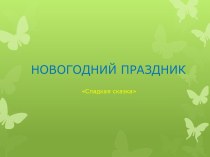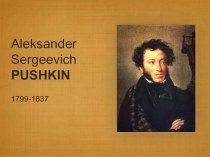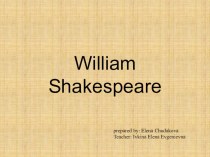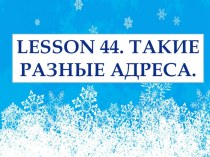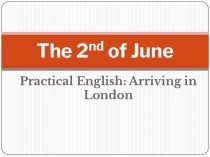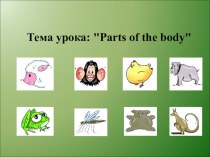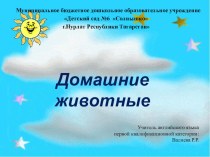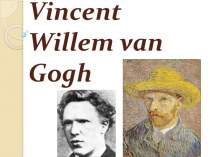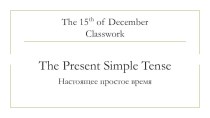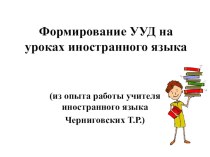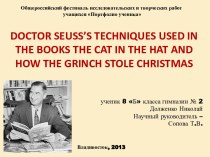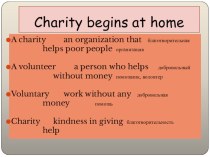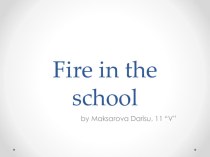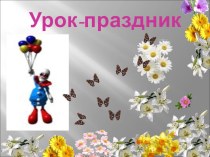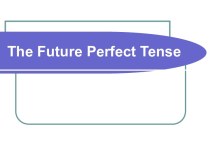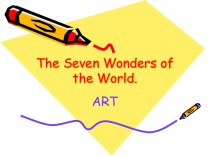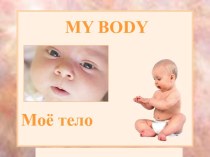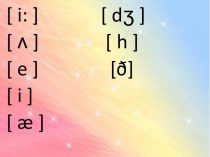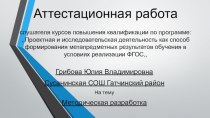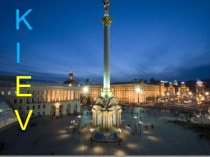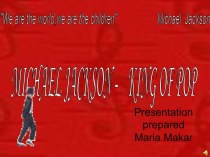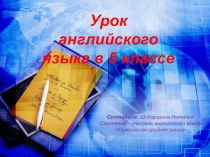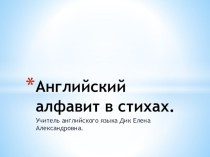- Главная
- Разное
- Бизнес и предпринимательство
- Образование
- Развлечения
- Государство
- Спорт
- Графика
- Культурология
- Еда и кулинария
- Лингвистика
- Религиоведение
- Черчение
- Физкультура
- ИЗО
- Психология
- Социология
- Английский язык
- Астрономия
- Алгебра
- Биология
- География
- Геометрия
- Детские презентации
- Информатика
- История
- Литература
- Маркетинг
- Математика
- Медицина
- Менеджмент
- Музыка
- МХК
- Немецкий язык
- ОБЖ
- Обществознание
- Окружающий мир
- Педагогика
- Русский язык
- Технология
- Физика
- Философия
- Химия
- Шаблоны, картинки для презентаций
- Экология
- Экономика
- Юриспруденция
Что такое findslide.org?
FindSlide.org - это сайт презентаций, докладов, шаблонов в формате PowerPoint.
Обратная связь
Email: Нажмите что бы посмотреть
Презентация на тему Неличные формы глагола
Содержание
- 2. ИНФИНИТИВ (THE INFINITIVE)ФОРМЫ ИНФИНИТИВАИНФИНИТИВ БЕЗ ЧАСТИЦЫ ИНФИНИТИВ БЕЗ ЧАСТИЦЫ “TO”СИНТАКСИЧЕСКИЕ ФУНКЦИИ ИНФИНИТИВАУПРАЖНЕНИЯ
- 3. ИНФИНИТИВ – неличная форма глагола, обладающая
- 4. ФОРМЫ ИНФИНИТИВА
- 5. ИНФИНИТИВ БЕЗ ЧАСТИЦЫ “to” После всех
- 6. СИНТАКСИЧЕСКИЕ ФУНКЦИИ ИНФИНИТИВА В ПРЕДЛОЖЕНИИ*
- 7. УПРАЖНЕНИЯ Translate from English into Russian Insert
- 8. TRANSLATE FROM ENGLISH INTO RUSSIAN Упражнения1. Nick
- 9. INSERT “to” WHERE REQUIRED8. Most people supposed
- 10. USE THE REQUIRED FORM OF THE INFINITIVE
- 11. STATE THE SYNTACTIC FUNCTION OF THE
- 12. ГЕРУНДИЙФОРМЫ ГЕРУНДИЯСВОЙСТВА ГЕРУНДИЯГЛАГОЛЫ И ВЫРАЖЕНИЯ, ТРЕБУЮЩИЕ ПОСЛЕ
- 13. ГЕРУНДИЙ (THE GERUND)ГЕРУНДИЙ - неличная форма глагола,
- 14. ФОРМЫ ГЕРУНДИЯ
- 15. СВОЙСТВА ГЕРУНДИЯМожет употребляться после предлога.
- 16. ГЛАГОЛЫ И ВЫРАЖЕНИЯ, ТРЕБУЮЩИЕ ПОСЛЕ СЕБЯ
- 17. ГЛАГОЛЫ И ВЫРАЖЕНИЯ, ТРЕБУЮЩИЕ ПОСЛЕ СЕБЯ
- 18. С НЕКОТОРЫМИ ГЛАГОЛАМИ ИСПОЛЬЗУЕТСЯ КАК ГЕРУНДИЙ, ТАК
- 19. СИНТАКСИЧЕСКИЕ ФУНКЦИИ ГЕРУНДИЯ В ПРЕДЛОЖЕНИИГЕРУНДИЙ МОЖЕТ УПОТРЕБЛЯЕТСЯ
- 20. УПРАЖНЕНИЯ Translate into Russian. Pay attention to
- 21. STATE THE SYNTACTIC FUNCTION OF THE
- 22. USE THE GERUND OR THE INFINITIVE:Упражнения1. I
- 23. USE THE REQUIRED FORM OF THE GERUND:1.
- 24. TRANSLATE INTO ENGLISH:Упражнения 1. Он думает однажды
- 25. ANSWER THE QUESTIONS:What films do you think
- 26. ПРИЧАСТИЕ (THE PARTICIPLE) СПОСОБЫ ОБРАЗОВАНИЯ ФОРМЫ ПРИЧАСТИЯ:
- 27. ПРИЧАСТИЕПРИЧАСТИЕ – неличная форма глагола, обладающая признаками
- 28. СПОСОБЫ ОБРАЗОВАНИЯВсего существует два причастия в английском
- 29. ФОРМЫ ПРИЧАСТИЯ (PARTICIPLE I)Причастие I имеет временные
- 30. ЗАПОМНИ:PParticiple I Indefinite используется для обозначенияпредшествующего действия,
- 31. ФОРМЫ ПРИЧАСТИЯ (PARTICIPLE II)Participle II имеет только
- 32. СВОЙСТВА ПРИЧАСТИЯПричастие сочетает в себе свойства глагола
- 33. СИНТАКСИЧЕСКИЕ ФУНКЦИИ ПРИЧАСТИЙ В ПРЕДЛОЖЕНИИПРИЧАСТИЕ НАСТОЯЩЕГО ВРЕМЕНИ
- 34. ПРИЧАСТИЕ ПРОШЕДШЕГО ВРЕМЕНИ (PARTICIPLE II)МОЖЕТ УПОТРЕБЛЯТЬСЯ В
- 35. УПРАЖНЕНИЯ Correct the mistakes Choose the correct
- 36. TRANSLATE INTO RUSSIANУпражнения1. She had her hair
- 37. FIND OUT IF THE SENTENCE IS RIGHT
- 38. CHOOSE THE CORRECT WORDУпражнения1.1. If … home
- 39. CORRECT THE MISTAKESУпражнения1. She heard her name
- 40. Скачать презентацию
- 41. Похожие презентации
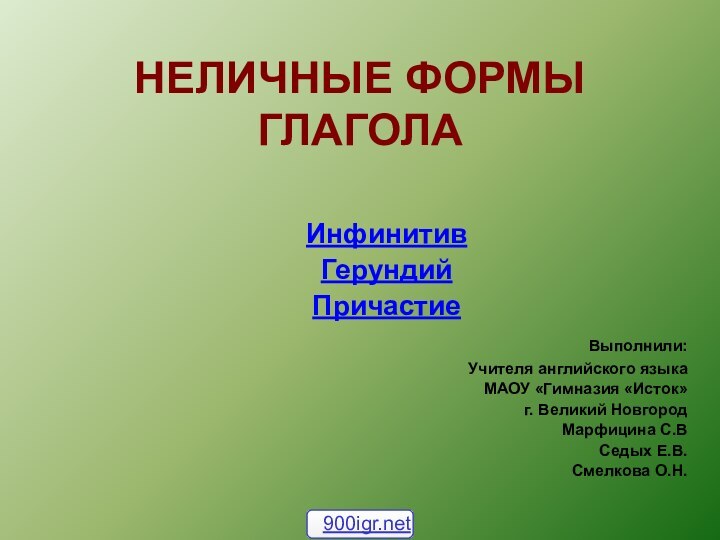


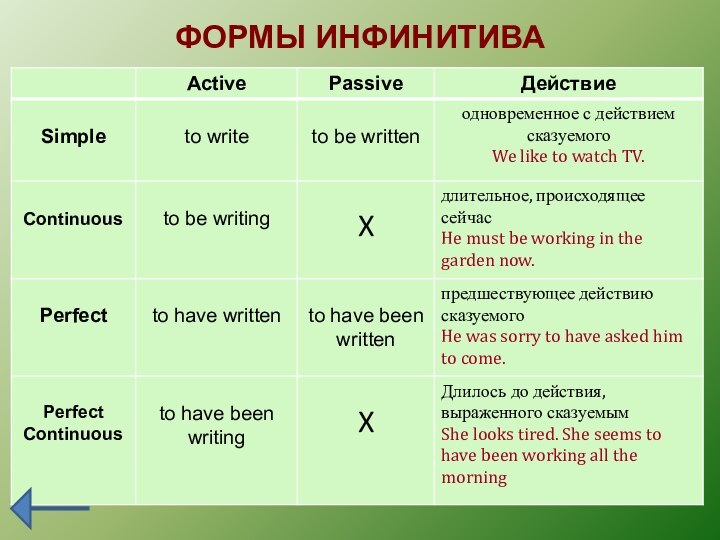
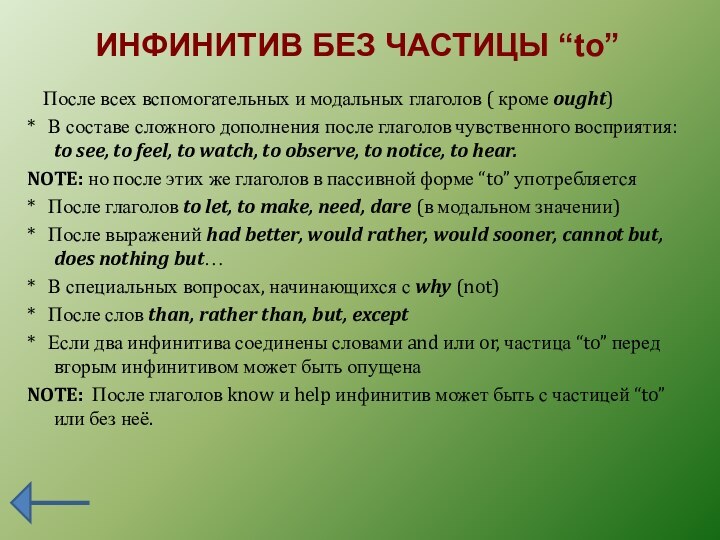


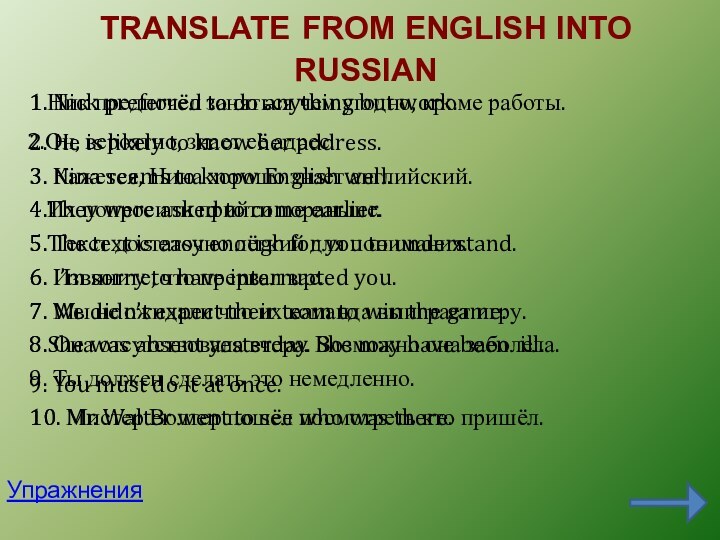
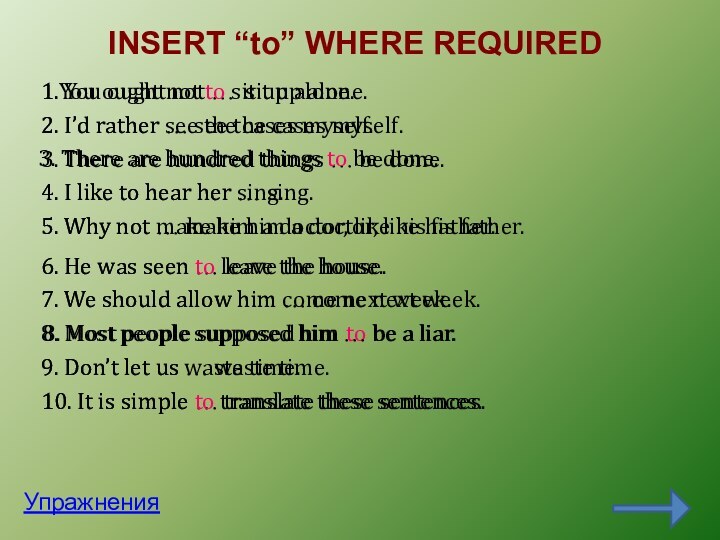
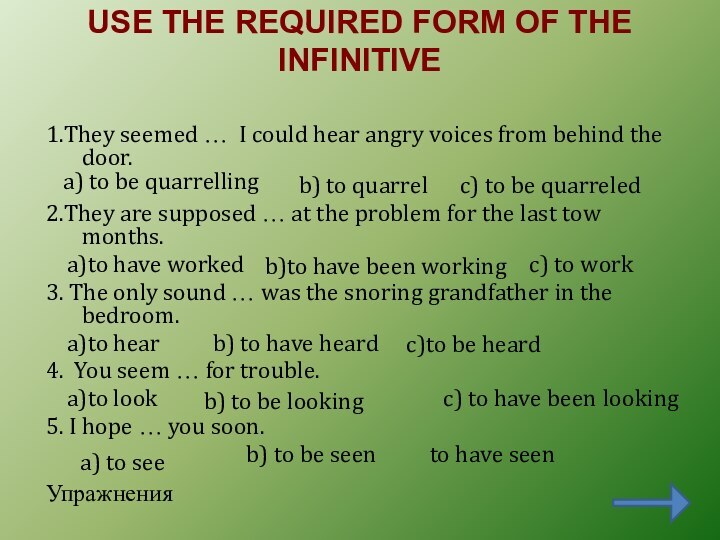

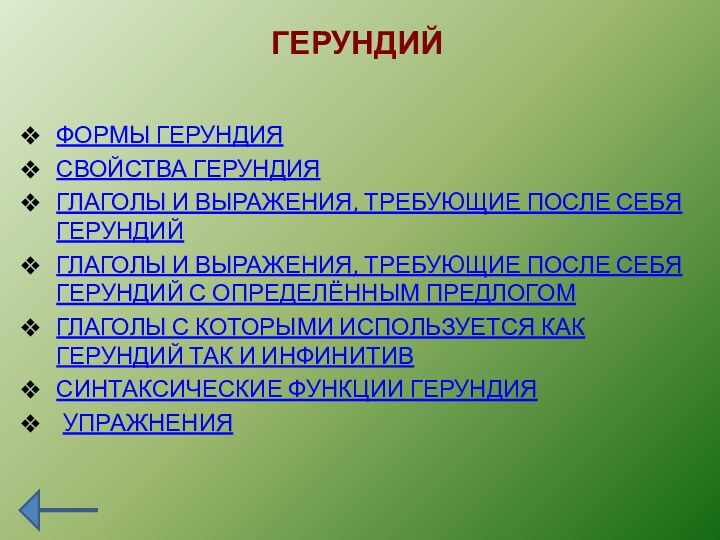

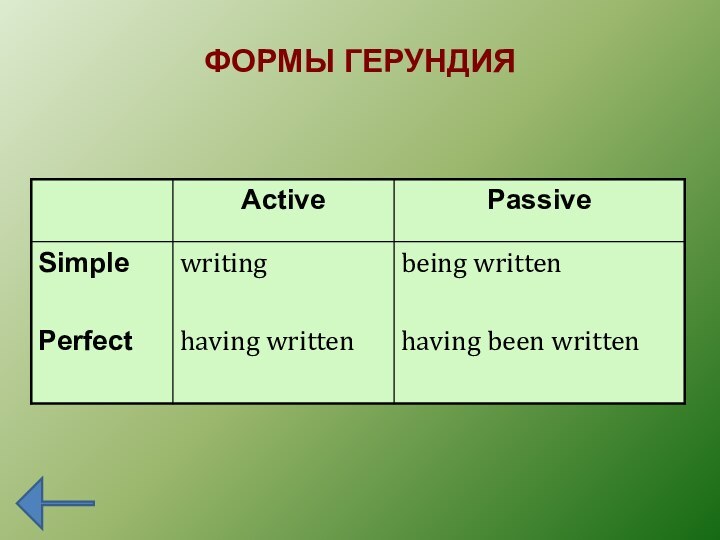

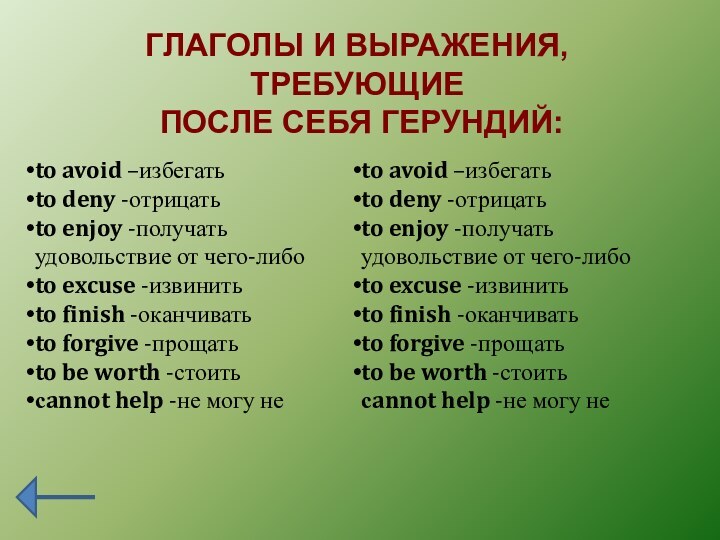

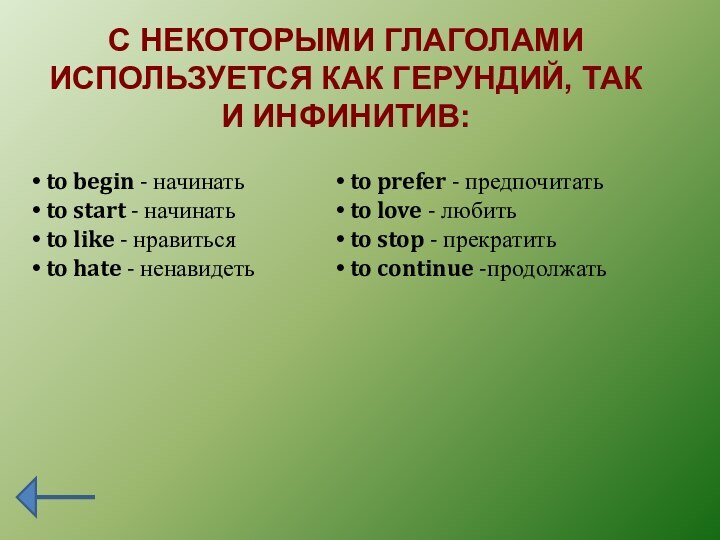
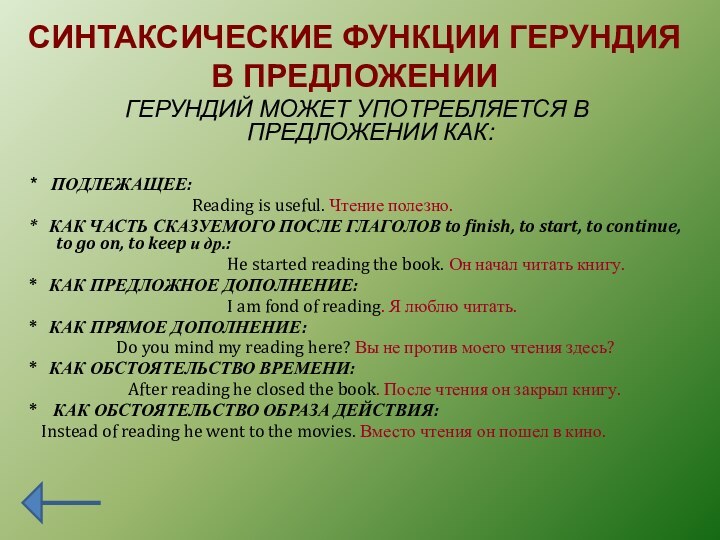

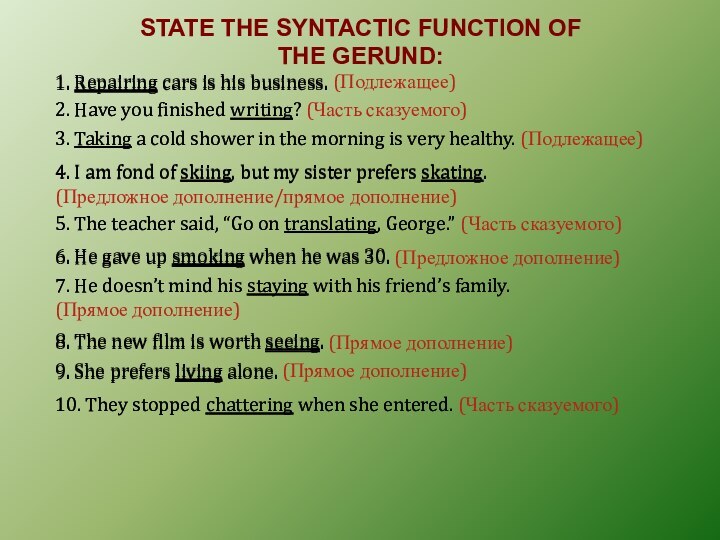

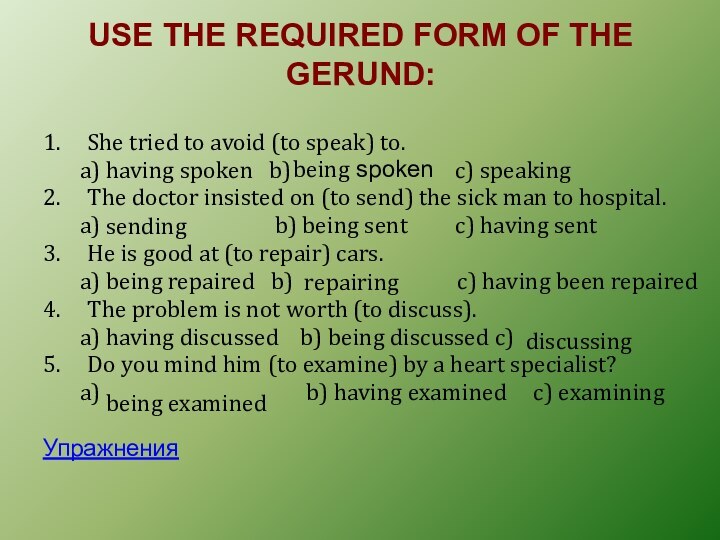
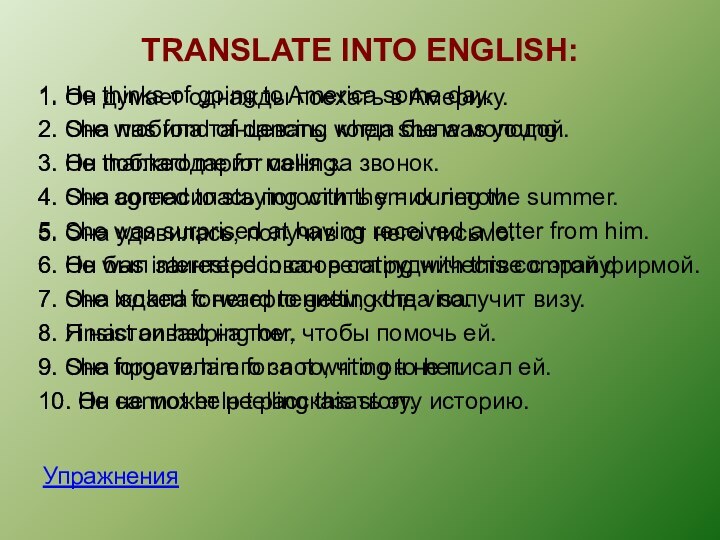
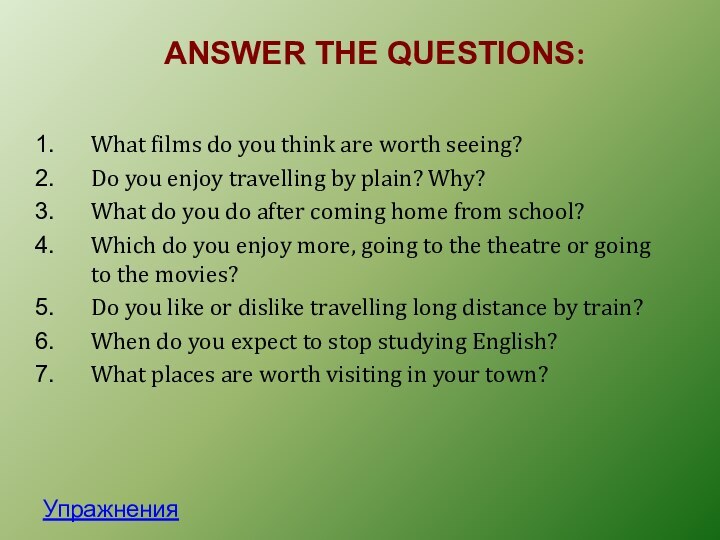
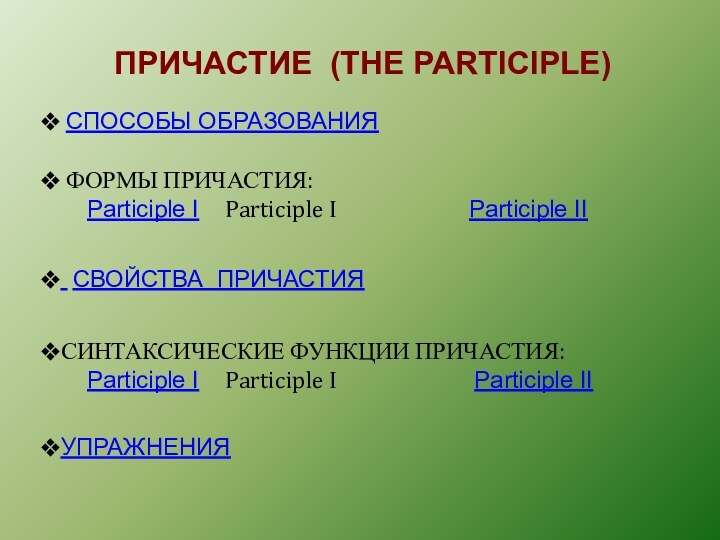

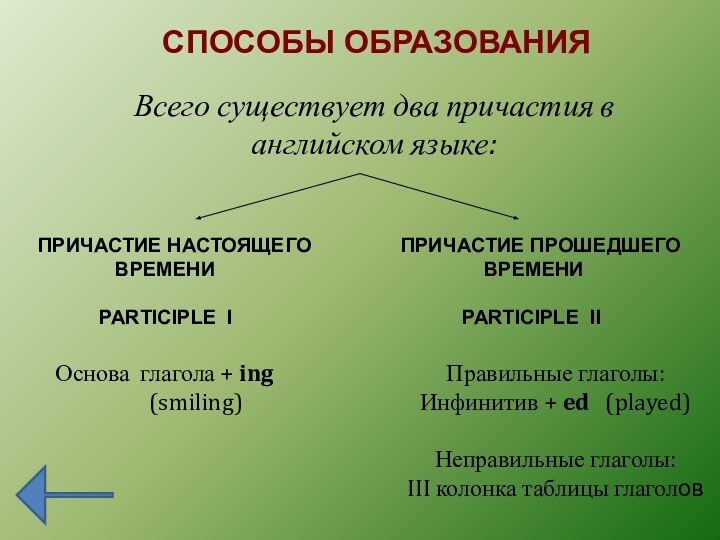




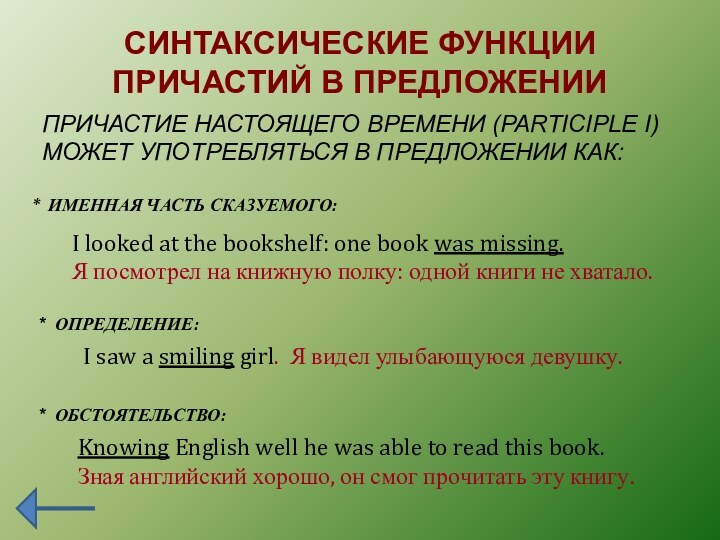

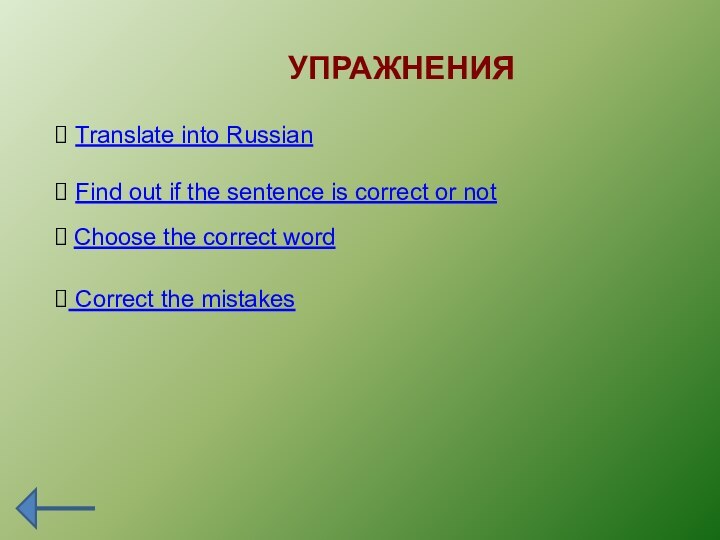

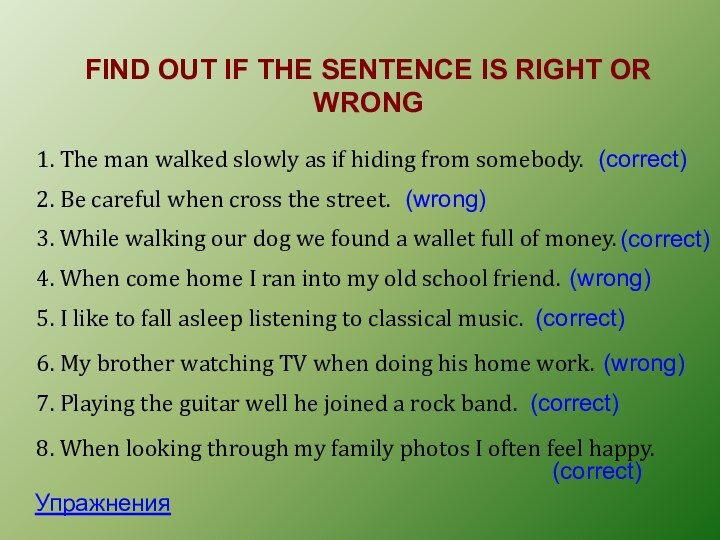


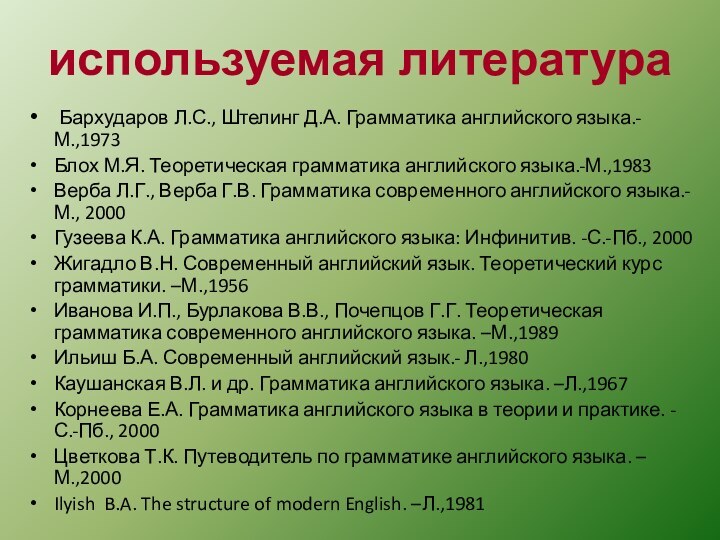
Слайд 3 ИНФИНИТИВ – неличная форма глагола, обладающая признаками глагола
и существительного. Признаком инфинитива является частица “to”. Инфинитив соответствует
в русском языке неопределённой форме глагола, которая отвечает на вопрос «что делать? что сделать?»ИНФИНИТИВ (THE INFINITIVE)
Слайд 5
ИНФИНИТИВ БЕЗ ЧАСТИЦЫ “to”
После всех вспомогательных
и модальных глаголов ( кроме ought)
* В составе
сложного дополнения после глаголов чувственного восприятия: to see, to feel, to watch, to observe, to notice, to hear.NOTE: но после этих же глаголов в пассивной форме “to” употребляется
* После глаголов to let, to make, need, dare (в модальном значении)
* После выражений had better, would rather, would sooner, cannot but, does nothing but…
* В специальных вопросах, начинающихся с why (not)
* После слов than, rather than, but, except
* Если два инфинитива соединены словами and или or, частица “to” перед вторым инфинитивом может быть опущена
NOTE: После глаголов know и help инфинитив может быть с частицей “to” или без неё.
Слайд 6
СИНТАКСИЧЕСКИЕ ФУНКЦИИ ИНФИНИТИВА
В ПРЕДЛОЖЕНИИ
* Подлежащее .
- To study is her duty.
* Частью составного
именного сказуемого .- His dream was to become an artist.* Частью составного глагольного сказуемого. - Now I begin to understand you.
* Дополнением. – Our students like to read.
* Определением, заменяющим целое придаточное определительное предложение. – My friend has brought me an interesting book to read.
* Обстоятельством
цели: I think I will go to England to improve my English.
результата: Mary knew English well enough to understand the text.
cравнения: Soon she realized that it was much more pleasant to give than to be given.
* Вводные слова (to begin with, to be frank, to put it mildly, to tell the truth, strange to say)
ИНФИНИТИВ МОЖЕТ УПОТРЕБЛЯТЬСЯ В ПРЕДЛОЖЕНИИ КАК:
Слайд 7
УПРАЖНЕНИЯ
Translate from English into Russian
Insert “to”
where required
Use the required form of the infinitive
State the syntactic function of the infinitive
Слайд 8
TRANSLATE FROM ENGLISH INTO RUSSIAN
Упражнения
1. Nick preferred to
do anything but work.
2. He is likely to know
her address.3. Nina seems to know English well.
4.They were asked to come earlier.
5.The text is easy enough for you to understand.
6. I’m sorry to have interrupted you.
7. We didn’t expect their team to win the game.
8.She was absent yesterday. She may have been ill.
1.Ник предпочёл заняться чем угодно, кроме работы.
2.Он, вероятно, знает её адрес.
3. Кажется, Нина хорошо знает английский.
4.Их попросили прийти пораньше.
5. Текст достаточно лёгкий для понимания.
6. Извините, что прервал вас.
7. Мы не ожидали что их команда выиграет игру.
8. Она отсутствовала вчера. Возможно она заболела.
9. You must do it at once.
9. Ты должен сделать это немедленно.
10. Mr. Walter went to see who was there.
10. Мистер Волтер пошёл посмотреть кто пришёл.
Слайд 9
INSERT “to” WHERE REQUIRED
8. Most people supposed him
to be a liar.
1. You ought not … sit
up alone.1.You ought not to sit up alone.
2. I’d rather … see the cases myself.
2. I’d rather see the cases myself.
3. There are hundred things … be done.
3. There are hundred things to be done.
4. I like to hear her … sing.
4. I like to hear her sing.
5. Why not … make him a doctor, like his father.
5. Why not make him a doctor, like his father.
6. He was seen … leave the house.
6. He was seen to leave the house.
7. We should allow him … come next week.
7. We should allow him come next week.
8. Most people supposed him … be a liar.
9. Don’t let us … waste time.
9. Don’t let us waste time.
10. It is simple … translate these sentences.
10. It is simple to translate these sentences.
Упражнения
Слайд 10
USE THE REQUIRED FORM OF THE INFINITIVE
1.They seemed
… I could hear angry voices from behind the
door.b) to quarrel c) to be quarreled
2.They are supposed … at the problem for the last tow months.
a)to have worked c) to work
3. The only sound … was the snoring grandfather in the bedroom.
a)to hear b) to have heard
4. You seem … for trouble.
a)to look c) to have been looking
5. I hope … you soon.
b) to be seen to have seen
Упражнения
a) to be quarrelling
b)to have been working
c)to be heard
b) to be looking
a) to see
Слайд 11
STATE THE SYNTACTIC FUNCTION OF
THE INFINITIVE:
6. She
needs a place to live in. (определение)
2. I asked
him to give me a magazine.1 To see means to believe. (подлежащее)
1. To see means to believe.
2.I asked him to give me a magazine. (прямое дополнение)
3.Our aim was to find Pete’s house.
3.Our aim was to find Pete’s house. (часть именного сказуемого)
4.To be there on time we must hurry. (обстоятельство цели)
4.To be there on time we must hurry.
5. She agreed to come at ten.
5. She agreed to come at ten. (дополнение)
6. She needs a place to live in.
8.You should follow a healthy diet.
8.You should follow a healthy diet. (составное глагольное сказуемое)
7.I asked him to give me a book.
7.I asked him to give me a book. (прямое дополнение)
Упражнения
Слайд 12
ГЕРУНДИЙ
ФОРМЫ ГЕРУНДИЯ
СВОЙСТВА ГЕРУНДИЯ
ГЛАГОЛЫ И ВЫРАЖЕНИЯ, ТРЕБУЮЩИЕ ПОСЛЕ СЕБЯ
ГЕРУНДИЙ
ГЛАГОЛЫ И ВЫРАЖЕНИЯ, ТРЕБУЮЩИЕ ПОСЛЕ СЕБЯ
ГЕРУНДИЙ С ОПРЕДЕЛЁННЫМ ПРЕДЛОГОМГЛАГОЛЫ С КОТОРЫМИ ИСПОЛЬЗУЕТСЯ КАК ГЕРУНДИЙ ТАК И ИНФИНИТИВ
СИНТАКСИЧЕСКИЕ ФУНКЦИИ ГЕРУНДИЯ
УПРАЖНЕНИЯ
Слайд 13
ГЕРУНДИЙ (THE GERUND)
ГЕРУНДИЙ - неличная форма глагола, имеющая
грамматические особенности как глагола так и существительного и всегда
выражающая действие как процесс.
Слайд 15
СВОЙСТВА ГЕРУНДИЯ
Может употребляться после предлога.
He is fond of reading
2. Может определяться притяжательным местоимением
и существительным в притяжательном или общем
падеже.
He insisted on my leaving at once.
Он настаивал, чтобы я ушел.
3. В предложении выполняет те же функции, что и
существительное.
Слайд 16
ГЛАГОЛЫ И ВЫРАЖЕНИЯ, ТРЕБУЮЩИЕ
ПОСЛЕ СЕБЯ ГЕРУНДИЙ:
to avoid
–избегать
to deny -отрицать
to enjoy -получать удовольствие от чего-либо
to excuse
-извинитьto finish -оканчивать
to forgive -прощать
to be worth -стоить
сannot help -не могу не
to avoid –избегать
to deny -отрицать
to enjoy -получать удовольствие от чего-либо
to excuse -извинить
to finish -оканчивать
to forgive -прощать
to be worth -стоить
сannot help -не могу не
Слайд 17 ГЛАГОЛЫ И ВЫРАЖЕНИЯ, ТРЕБУЮЩИЕ ПОСЛЕ СЕБЯ ГЕРУНДИЙ С
ОПРЕДЕЛЕННЫМИ ПРЕДЛОГАМИ:
to depend of -зависеть от
to rely on -полагаться
наto insist on -настаивать на
to object to -возражать против
to agree to -соглашаться на
to hear of -слышать о
to think of -думать о
to thank for -благодарить за
to prevent from -препятствовать
to be fond of -любить
to be sure of -быть уверенным в чем-либо
to be pleased at -быть довольным чем-либо
to be surprised at -удивляться чему-либо
to be interested in -интересоваться чем-либо
to be afraid of -бояться чего-либо
to look forward to -ждать с нетерпением
Слайд 18 С НЕКОТОРЫМИ ГЛАГОЛАМИ ИСПОЛЬЗУЕТСЯ КАК ГЕРУНДИЙ, ТАК И
ИНФИНИТИВ:
to begin - начинать
to start - начинать
to like - нравитьсяto hate - ненавидеть
to prefer - предпочитать
to love - любить
to stop - прекратить
to continue -продолжать
Слайд 19
СИНТАКСИЧЕСКИЕ ФУНКЦИИ ГЕРУНДИЯ
В ПРЕДЛОЖЕНИИ
ГЕРУНДИЙ МОЖЕТ УПОТРЕБЛЯЕТСЯ В ПРЕДЛОЖЕНИИ
КАК:
* ПОДЛЕЖАЩЕЕ:
Reading is useful. Чтение полезно.* КАК ЧАСТЬ СКАЗУЕМОГО ПОСЛЕ ГЛАГОЛОВ to finish, to start, to continue, to go on, to keep и др.:
He started reading the book. Он начал читать книгу.
* КАК ПРЕДЛОЖНОЕ ДОПОЛНЕНИЕ:
I am fond of reading. Я люблю читать.
* КАК ПРЯМОЕ ДОПОЛНЕНИЕ:
Do you mind my reading here? Вы не против моего чтения здесь?
* КАК ОБСТОЯТЕЛЬСТВО ВРЕМЕНИ:
After reading he closed the book. После чтения он закрыл книгу.
* КАК ОБСТОЯТЕЛЬСТВО ОБРАЗА ДЕЙСТВИЯ:
Instead of reading he went to the movies. Вместо чтения он пошел в кино.
Слайд 20
УПРАЖНЕНИЯ
Translate into Russian. Pay attention to the
Gerund. Define its function.
Use the Gerund or the
InfinitiveUse the gerund in active or passive form.
Translate into English
Answer the questions
Слайд 21
STATE THE SYNTACTIC FUNCTION OF
THE GERUND:
1.
Repairing cars is his business.
1. Repairing cars is
his business. (Подлежащее)2. Have you finished writing?
2. Have you finished writing? (Часть сказуемого)
3. Taking a cold shower in the morning is very healthy.
3. Taking a cold shower in the morning is very healthy. (Подлежащее)
4. I am fond of skiing, but my sister prefers skating.
4. I am fond of skiing, but my sister prefers skating.
(Предложное дополнение/прямое дополнение)
5. The teacher said, “Go on translating, George.”
5. The teacher said, “Go on translating, George.” (Часть сказуемого)
6. He gave up smoking when he was 30.
6. He gave up smoking when he was 30. (Предложное дополнение)
7. He doesn’t mind his staying with his friend’s family.
7. He doesn’t mind his staying with his friend’s family.
(Прямое дополнение)
8. The new film is worth seeing.
8. The new film is worth seeing. (Прямое дополнение)
9. She prefers living alone.
9. She prefers living alone. (Прямое дополнение)
10. They stopped chattering when she entered.
10. They stopped chattering when she entered. (Часть сказуемого)
Слайд 22
USE THE GERUND OR THE INFINITIVE:
Упражнения
1. I started
(write) my letter this afternoon.
1. I started to write/writing
my letter this afternoon.2. She promised (go) to the doctor.
2. She promised to go to the doctor.
3. (Travel) by air is interesting.
3. Travelling by air is interesting.
4. She enjoys (cook) Indian meals.
4. She enjoys cooking Indian meals.
5. Would you mind (open) the window?
5. Would you mind opening the window?
6. I’m looking forward to (see) my parents again.
6. I’m looking forward seeing my parents again.
7. Peter gave up (learn) Chinese.
7. Peter gave up learning Chinese.
8. Sasha stopped (read) the advertisement.
8. Sasha stopped to read the advertisement.
9. Alison likes (sit) at home and (read) the books in the evening.
9. Alison likes to sit/sitting at home and to read/reading the books in the evening.
10. She kept on (tell) lies.
10. She kept on telling lies.
Слайд 23
USE THE REQUIRED FORM OF THE GERUND:
1.
She tried to avoid (to speak) to.
a) having spoken b) c) speaking2. The doctor insisted on (to send) the sick man to hospital.
a) b) being sent c) having sent
3. He is good at (to repair) cars.
a) being repaired b) c) having been repaired
4. The problem is not worth (to discuss).
a) having discussed b) being discussed c)
5. Do you mind him (to examine) by a heart specialist?
a) b) having examined c) examining
Упражнения
being spoken
sending
repairing
discussing
being examined
Слайд 24
TRANSLATE INTO ENGLISH:
Упражнения
1. Он думает однажды поехать
в Америку.
1. He thinks of going to America some
day.2. Она любила танцевать, когда была молодой.
2. She was fond of dancing when she was young.
3. Он поблагодарил меня за звонок.
3. He thanked me for calling.
4. Она согласилась погостить у них летом.
4. She agreed to staying with them during the summer.
5. Она удивилась, получив от него письмо.
5. She was surprised at having received a letter from him.
6. Он был заинтересован в сотрудничестве с этой фирмой.
6. He was interested in cooperating with this company.
7. Она ждала с нетерпением, когда получит визу.
7. She looked forward to getting the visa.
8. Я настаиваю на том, чтобы помочь ей.
8. I insist on helping her.
9. Она простила его за то, что он не писал ей.
9. She forgave him for not writing to her.
10. Он не может не рассказать эту историю.
10. He cannot help telling this story.
Слайд 25
ANSWER THE QUESTIONS:
What films do you think are
worth seeing?
Do you enjoy travelling by plain? Why?
What do
you do after coming home from school?Which do you enjoy more, going to the theatre or going to the movies?
Do you like or dislike travelling long distance by train?
When do you expect to stop studying English?
What places are worth visiting in your town?
Упражнения
Слайд 26
ПРИЧАСТИЕ (THE PARTICIPLE)
СПОСОБЫ ОБРАЗОВАНИЯ
ФОРМЫ ПРИЧАСТИЯ:
Participle I Participle I
Participle II
СИНТАКСИЧЕСКИЕ ФУНКЦИИ ПРИЧАСТИЯ:
Participle I Participle I Participle II
УПРАЖНЕНИЯ
СВОЙСТВА ПРИЧАСТИЯ
Слайд 27
ПРИЧАСТИЕ
ПРИЧАСТИЕ – неличная форма глагола, обладающая признаками глагола,
прилагательного и наречия. Является самостоятельной частью речи. В английском
языке нет такой части речи, как деепричастие. Поэтому в русском языке английскому причастию соответствует как причастие, так и деепричастие.
Слайд 28
СПОСОБЫ ОБРАЗОВАНИЯ
Всего существует два причастия в английском языке:
ПРИЧАСТИЕ
НАСТОЯЩЕГО
ВРЕМЕНИ
PARTICIPLE IПРИЧАСТИЕ ПРОШЕДШЕГО
ВРЕМЕНИ
PARTICIPLE II
Основа глагола + ing
(smiling)
Правильные глаголы:
Инфинитив + ed (played)
Неправильные глаголы:
III колонка таблицы глаголов
Слайд 29
ФОРМЫ ПРИЧАСТИЯ (PARTICIPLE I)
Причастие I имеет временные различия
(Indefinite, Perfect), а причастие I, образованное от переходных глаголов,
имеет различия залога (Active, Passive)
Слайд 30
ЗАПОМНИ:
P
Participle I Indefinite используется для обозначения
предшествующего действия, если
мы имеем глаголы
восприятия
и движенияto see
to feel
to notice
to hear
to come, to enter
to arrive, to leave
to turn, to seize
Hearing some noise at the corridor I locked the door.
Entering the room she greeted everybody.
Слайд 31
ФОРМЫ ПРИЧАСТИЯ (PARTICIPLE II)
Participle II имеет только одну
форму. Говоря о временных
различиях причастия II, следует учесть,
что оно можетвыражать действие одновременное с глаголом или
предшествующее глаголу.
His eyes fixed on me irritated me. (одновремен. действ.)
I remember the picture seen in the museum. (предшеств. действ.)
Причастие II используется в основном в пассивном
залоге.
I saw a broken cup on the floor.
Passive voice
Слайд 32
СВОЙСТВА ПРИЧАСТИЯ
Причастие сочетает в себе свойства глагола (имеет
категории времени, вида, залога) и прилагательного (в предложении причастие
может выполнять функцию определения)PARTICIPLE I сочетает в себе признаки глагола, наречия и прилагательного
GOING – идущий / идя
READING – читающий /читая
PARTICIPLE II образуется от основы инфинитива
TO WRITE – WRITTEN –написанный
TO PLAY – PLAYED - сыгранный
Слайд 33
СИНТАКСИЧЕСКИЕ ФУНКЦИИ ПРИЧАСТИЙ В ПРЕДЛОЖЕНИИ
ПРИЧАСТИЕ НАСТОЯЩЕГО ВРЕМЕНИ (PARTICIPLE
I)
МОЖЕТ УПОТРЕБЛЯТЬСЯ В ПРЕДЛОЖЕНИИ КАК:
* ИМЕННАЯ ЧАСТЬ СКАЗУЕМОГО:
I looked
at the bookshelf: one book was missing.Я посмотрел на книжную полку: одной книги не хватало.
* ОПРЕДЕЛЕНИЕ:
I saw a smiling girl. Я видел улыбающуюся девушку.
* ОБСТОЯТЕЛЬСТВО:
Knowing English well he was able to read this book.
Зная английский хорошо, он смог прочитать эту книгу.
Слайд 34
ПРИЧАСТИЕ ПРОШЕДШЕГО ВРЕМЕНИ (PARTICIPLE II)
МОЖЕТ УПОТРЕБЛЯТЬСЯ В ПРЕДЛОЖЕНИИ
КАК:
* ИМЕННАЯ ЧАСТЬ СКАЗУЕМОГО:
The climate of Russia is varied.
Климат
России разнообразен.* ОПРЕДЕЛЕНИЕ:
My photo lost in the park is important.
Моя фотография, потерянная в парке, важная.
* ОБСТОЯТЕЛЬСТВО:
When given freedom I’ll build a house.
Когда выйду на свободу, я построю дом.
Слайд 35
УПРАЖНЕНИЯ
Correct the mistakes
Choose the
correct word
Translate into Russian
Find out if the
sentence is correct or not
Слайд 36
TRANSLATE INTO RUSSIAN
Упражнения
1. She had her hair done
yesterday.
1. Она уложила волосы вчера.
2. I must get my
TV repaired.2. Я должен получить мой телевизор починенным.
3. The sun having risen, we continued our way.
3. Хотя солнце встало, мы продолжили наш путь.
4. I saw him running.
4. Я видел, как он бежит.
5. I remembered him locking the door.
5. Я вспомнил его, закрывающим дверь.
6. She was heard singing in the corridor.
6. Было слышно, как она поет в коридоре.
7. He wanted this work done quickly.
7. Он хотел, чтобы эта работа была сделана быстро.
Слайд 37 FIND OUT IF THE SENTENCE IS RIGHT OR
WRONG
Упражнения
1. The man walked slowly as if hiding from
somebody.(correct)
2. Be careful when cross the street.
(wrong)
3. While walking our dog we found a wallet full of money.
(correct)
4. When come home I ran into my old school friend.
(wrong)
5. I like to fall asleep listening to classical music.
(correct)
6. My brother watching TV when doing his home work.
(wrong)
7. Playing the guitar well he joined a rock band.
(correct)
8. When looking through my family photos I often feel happy.
(correct)
Слайд 38
CHOOSE THE CORRECT WORD
Упражнения
1
.
1. If … home in
a taxi we shall save a lot of time.
(---, got, put, taken)1. If taken home in a taxi we shall save a lot of time.
2. When … freedom I’ll build a house and get married. (---, got, given, put)
2. When given freedom I’ll build a house and get married.
3. … to college the boy is now missing his friends. (---, got, put, sent)
3. Sent to college the boy is now missing his friends.
4. … up in leather she attracted men’s attention. (---, broken, dressed, put)
4. Dressed up in leather she attracted men’s attention.
5. Even … the construction looked impressive. (---, taken, put, broken)
5. Even broken the construction looked impressive.
6. My credit card … in the park has much money on it. (---, got, lost, put)
6. My credit card lost in the park has much money on it.
Слайд 39
CORRECT THE MISTAKES
Упражнения
1. She heard her name call.
1.
She heard her name called.
2. I was kept to
wait in the hall for an hour.2. I was kept waiting in the hall for an hour.
3. They were seen crossed the street.
3. They were seen crossing the street.
4. We want to have our piano to tune.
4. We want to have our piano tuned.
5. We’ll have the house to paint.
5. We’ll have the house painted.
6. I saw the girl to dance in the hall.
6. I saw the girl dancing in the hall.
